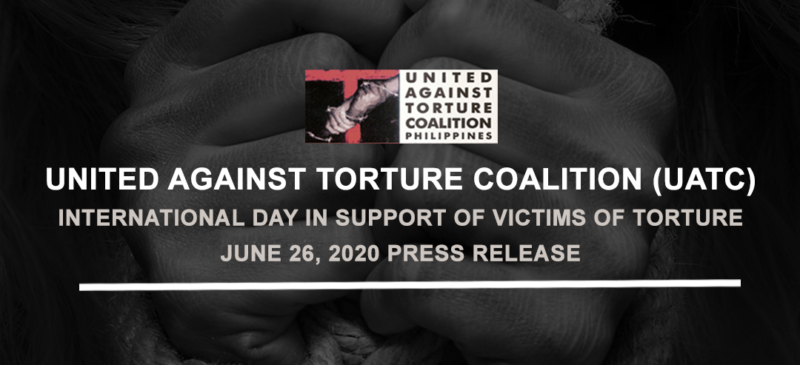United Against Torture Coalition (UATC) – Philippines
Press Release
26 June 2020
Torture free Philippines should be the “new normal”
Today 26 June[1], the United Against Torture Coalition (UATC)-Philippines, a broad network of human rights organizations and human rights defenders together with its partners, In Defense of Human Rights and Dignity Movement (iDEFEND), Philippine Alliance of Human Rights Advocates (PAHRA), World Organisation Against Torture (OMCT) and the Commission on Human Rights of the Philippines (CHRP), are one with the world in commemoration of the International Day in Support of Victims of Torture and in contributing to the campaign for the absolute prohibition of torture in all corners of the world.
On this day in 1987, the UN Convention against Torture and other Cruel, Inhuman or Degrading Treatment or Punishment came into effect. The Philippines[2] acceded to this Convention on 18 June 1986.
Torture is an unequivocal crime. Under the UN Convention against Torture, it is prohibited under all circumstances, without exception. Yet torture is still commonplace and systematically being practiced by many States including the Philippines in the conduct of custodial investigation under the guise of combatting terrorism, curbing criminality, and maintaining peace and order, which risk eroding constitutional and other legal protections. While the Philippines is considered one of its kind in Asia for criminalizing torture as a specific criminal offense with the passage of the Anti-Torture Act in 2009[3], however the Philippine government failed to fully and effectively implement the law with reported cases of torture and ill treatment continue unabated.
According to Rose Trajano, PAHRA Secretary General, “despite having a law criminalizing torture and ill-treatment, there are still reported cases of torture being committed inside detention centers and prison cells, on the city streets and in remote villages.” Trajano added that in the height of the government’s war on drug campaign, most of those who were reportedly killed during the police anti-drug operations have marked similar to that of torture. She warned that “the Anti-Terror bill which is just awaiting the President’s signature will further institutionalize the acts of torture as the proposed law authorizing warrantless arrests and prolonged detention of suspects by which torture usually occurs.”
Since Pres. Rodrigo Duterte placed the Philippine island of Luzon and different parts of the country on lockdown on 15 March 2020, there were hundreds of arrests made by the authorities in the National Capital Region, and other parts of the country. The Joint Task Force Covid Shield started releasing daily reports on 30 March, and by then the number of arrested was already 19,340, excluding tens of thousands who were apprehended, but were just either warned or fined, supposedly for violating quarantine rules. From the start of April to May 10, the number of daily arrests did not go below 400, and there were 9 days when police arrested more than 1,000 in a day.[4]
The Task Force Detainees of the Philippines (TFDP) has monitored that most of those arrested who allegedly violated quarantine restrictions suffered from cruel and degrading treatment or punishment such as the locking up of five youths inside a dog cage, some curfew violators were ordered to sit in the intense midday sun, and others were paraded chanting prayers and promises not to do it again.
“Today eleven years after the passage of the anti-torture law, it remains a practice. These dehumanizing acts must be banished from our midst through arrests and effective prosecution of torturers. Torture must have no place in our society,” said Fr. Christian Buenafe, O.Carm, Chairperson of TFDP.
In the recent report[5] of the Office of the UN High Commissioner for Human Rights (OHCHR)[6] on the human rights situation in the Philippines, the report observed that “the response to COVID-19 has seen the same heavy-handed security approach that appears to have been mainstreamed through the ramped-up drug war and counter-insurgency imperatives.” The report also noted that ‘in just the first four months of 2020, including during the COVID-19 pandemic, “harmful rhetoric from the highest levels of the Government has been pervasive and deeply damaging. The rhetoric has ranged from degrading and sexually-charged comments against women human rights defenders, politicians and combatants – including rape “jokes” – to statements making light of torture, calling for bombing of indigenous peoples, encouraging extreme violence against drug users and peddlers – even offering bounties, calling for beheadings of civil society actors, and warning that journalists were not immune from “assassination”.”
“This act of cruelty leaves unseen scars especially on mind of the torture victims that last a lifetime”, as explained by Edeliza Hernandez, Executive Director of the Medical Action Group (MAG) on the effects of torture. Hernandez emphasized that torture does not only torment the victims but the society as well. And she pointed out that majority of the perpetrators go unpunished and most torture victims are usually from vulnerable sectors who lack resources to access lawyer and doctor they are entitled to.
Wilnor Papa of the Amnesty International-Philippines concluded, “the COVID 19 pandemic places us in an unprecedented situation that needs strong commitments and actions from the Philippine government and other stakeholders to respect fundamental rights and freedom particularly the right not to be tortured in this time of crisis.”-end-
#NoToTorture #TortureFreeIsTheBestNormal
Contact person: Edgardo Cabalitan
Task Force Detainees of the Philippines
Secretariat, UATC-Philippines
Mobile phone no. +63906-0068901
[1] The UN General Assembly proclaimed 26 June as the International Day in Support of Victims of Torture in December 2017.
[2] Philippines acceded to the Optional Protocol to the Convention Against Torture (OPCAT) in April 2012.
[3] https://www.officialgazette.gov.ph/2009/11/10/republic-act-no-9745/
[4] https://www.rappler.com/newsbreak/iq/264432-coronavirus-pandemic-charts-daily-arrests-filing-delays-leave-filipinos-in-jails
[5] https://news.un.org/en/story/2020/06/1065582
[6] https://www.ohchr.org/EN/NewsEvents/Pages/DisplayNews.aspx?NewsID=25924&LangID=E

